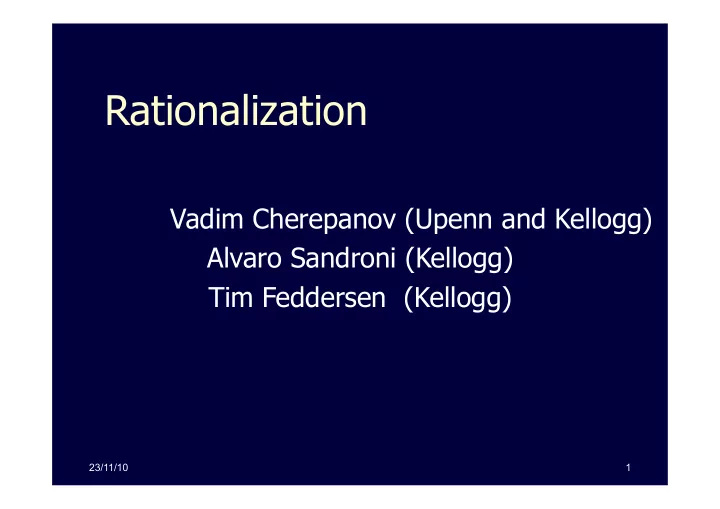

Rationalization Vadim Cherepanov (Upenn and Kellogg) Alvaro Sandroni (Kellogg) Tim Feddersen (Kellogg) 23/11/10 1
Economics and Psychology Economics: Agents think to relate means and consequences Choice = Preference Psychology: "[e]veryone feels that as a rational creature he must be able to give a connected, logical and continuous account of himself, his conduct and opinions, and all his mental processes are unconsciously manipulated and revised to that end." Ernest Jones, 1908 ”Rationalisation in every-day life.” “This apparently simple idea is one of most far-reaching significance, both to psychology and to the sciences, such as sociology, that must be founded in psychology. We are beginning to see man not as the smooth self-acting agent he pretends to be, but as he really is, a creature only dimly conscious of the various influences that mould his thought and action, and blindly resisting with all the means at his command the forces that are making for a higher and fuller consciousness” 23/11/10 2
Discrimination (Avoiding the Handicapped, Snyder et al.) x Movie 1 y Movie 2 z Movie 1 with a person in wheelchair {x,y} {y,z} {x,z} ; {x,y,z} Hard to rationalize seeing the movie alone if the movies are the same, but not if they differ. Preferences x y z { x,z } feasible τ { x,z } = {z} psychologically feasible 23/11/10 3
Model of a Decision-maker Rationalization as a psychological constraint. If the decision maker (Dee) cannot justify an action to herself than she will not take it (even if she prefers it to all feasible alternatives) Dee has preferences U and a set of rationales {Ri, i=1,...,n} B Feasible set ; τ (B) ⊆ B Psychologically feasible x in τ (B) iff for some rationale Ri x Ri y for every y in B Choice C(B) maximizes U s.t. τ (B) 23/11/10 4
Literature Review Manzini and Mariotti (2007, 2009) Ambrus, A., and K. Rozen. (2008) Carillo, J. and T. Mariotti (2000) Chambers. C. and T. Hayashi (2008) Dekel, E., B. Lipman, and A. Rustichini (2001) Eliaz, K. and E. Ok (2006) Green, J., and D. Hojman. (2007) Gul, F. and W. Pesendorfer (2004, 2005) Kalai, G., A. Rubinstein, and R. Spiegler (2002) Masatlioglu, Y. and D. Nakajima (2007) Ok, E., P. Ortoleva, and G. Riella (2008) Salant, Y. and A. Rubinstein (2006) Spiegler, R. (2002, 2004) Masatlioglu, Nakajima and Ozbay (2009) Houy and Tadenuma (2009) Lehrer and Teper (2008) 23/11/10 5
Results 1) Empirical Content of Rationalization Theory Violation of Weak WARP { x ,y} ⊆ {x,y,z,….} ⊆ {x,y,z,w….} Th 1: Equivalence of rationalization and Weak WARP Cor : Anomalies (e.g., cycles) are consistent with basic principle of constrained optimization of preference 23/11/10 6
Why Law Breeds Cycles (with Leo Katz) Constitution/Legislators/Judges/Citizens Cycles of a Law-Abiding Citizen. Duress : Defendant is threatened to help assailant. She greatly cares about her life-work manuscript. x helps assailant y endures pain z yields manuscript {x,y} {y,z} {x,z} Necessity; Self-defense; Negligence 23/11/10 7
Results (cont) Th 2 : Full characterization of revealed preferences { x ,y} ⊆ {x,y,z,….} iff x is revealed preferred to y Revealed preferences made (only) through anomalies. Avoiding the Handicapped. We cannot conclude that Dee wants to see the movie alone unless we also assume 1) Dee preference is a complete order 2) Dee can rationalize watching the movie with the handicap Need to rationalize (universal) Rationales themselves (culture-specific) 23/11/10 8
Minimal Constraint Principle To make additional inferences on motivations we need More data (speech) leading to assumptions like y in τ (x,y) Minimal Constraint Principle Two models (U, τ ) and (U’, τ ’) underlie C τ ’(B) ⊆ τ (B) , with some strict inclusion, eliminate (U’, τ ’) Th 3: U survives the minimal constraint principle iff some data (speech) can reveal U as Dee’s preferences. Th 4: In absence of cycles, Dee’s preferences are revealed by her binary choices (even if choices are anomalous) 23/11/10 9
Economics and Psychology ― [T]here is one and only one social responsibility of business –to use its resources and engage in activities designed to increase its profits so long as it stays within the rules of the game, which is to say, engages in open and free competition without deception or fraud ǁ‗ (Milton Friedman, 1970) 23/11/10 10
Recommend
More recommend